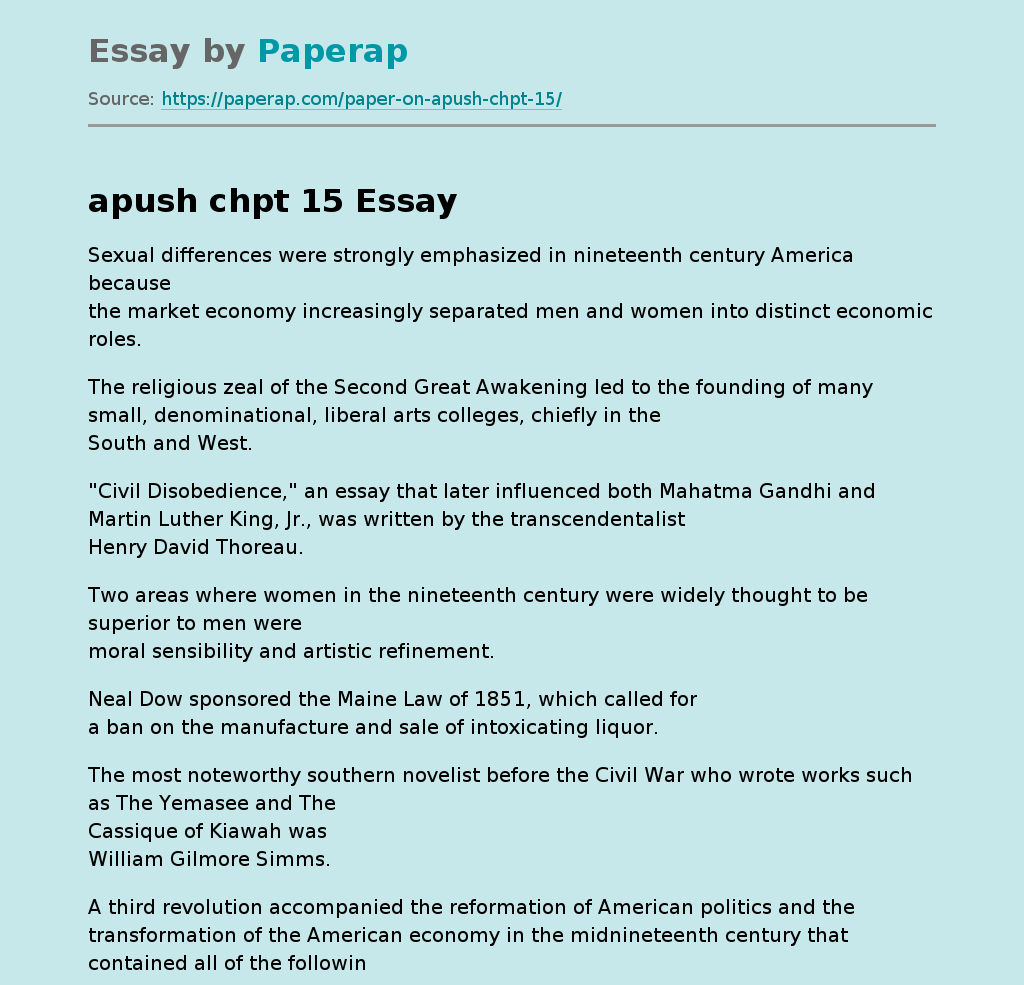Gendered Markets in 19th Century America
Topics:
America
Essay,
Pages 3 (626 words)
Views
34
Sexual differences were strongly emphasized in nineteenth century America because
the market economy increasingly separated men and women into distinct economic roles.
The religious zeal of the Second Great Awakening led to the founding of many small, denominational, liberal arts colleges, chiefly in the
South and West.
“Civil Disobedience,” an essay that later influenced both Mahatma Gandhi and Martin Luther King, Jr., was written by the transcendentalist
Henry David Thoreau.
Two areas where women in the nineteenth century were widely thought to be superior to men were
moral sensibility and artistic refinement.
Neal Dow sponsored the Maine Law of 1851, which called for
a ban on the manufacture and sale of intoxicating liquor.
The most noteworthy southern novelist before the Civil War who wrote works such as The Yemasee and The
Cassique of Kiawah was
Cassique of Kiawah was
William Gilmore Simms.
A third revolution accompanied the reformation of American politics and the transformation of the American economy in the midnineteenth century that contained all of the following characteristics except
focused on preserving the traditions of the founders.
All the following are true of the Second Great Awakening except that it
was not as large, democratic, or influential in terms of social reform as the First Great Awakening.
Transcendentalists believed that all knowledge came through
an inner light.
Noah Webster’s dictionary
helped to standardize the American language.
Those seeking to reform women’s style of dress in the 1840s claimed all of the following except
that bloomer style trousers were necessary to prevent a woman’s sexuality from becoming unhinged leading to immoral actions with a man who was not her husband.
All of the following influenced transcendental thought except
Catholicism and the papacy.
Unitarians held the following beliefs except
they believed in a stern and Puritan type of God.
Most of the utopian communities in pre-1860s America held ____ as one of their founding ideals.
cooperative social and economic practices
Of the following, the most successful of the early nineteenth century communitarian experiments was at
Oneida, New York.
Perhaps the greatest inhibiting factor for American artists in the first half of the nineteenth century was the
Puritan prejudice that art was a waste of time.
The Hudson River school excelled in the art of painting
landscapes.
The Second Great Awakening tended to
promote religious diversity.
Which of these is NOT associated with the rise of the modern women’s rights movement in 1848?
The call to boycott traditional marriage as oppressive to women
All of the following contributed to the appeal of the Second Great Awakening to women except
it encouraged women to enter into professions normally reserved for men in order to make these professional more ethical and morally upright.
A genuinely American literature received a strong boost from the
wave of nationalism that followed the War of 1812.
The religious sects that gained most from the revivalism of the Second Great Awakening were the
Methodists and Baptists.
According to John Humphrey Noyes, founder of the utopian Oneida Community, the key to happiness is
the suppression of selfishness.
As one the greatest of the revivalist preachers, Charles Grandison Finney advocated
All of these choices are correct.
A dark writer whose genres included poetry, horror stories, and detective fiction was
Edgar Allan Poe.
The original prophet of the Mormon religion was
Joseph Smith.
America’s artistic achievements in the first half of the nineteenth century
borrowed heavily from existing European styles in painting and architecture.
Match each individual below with his or her achievement.
A-4, B-2, C-1, D-3
The American medical profession by 1860 was noted for
its still primitive standards.
The writer who faded to obscurity in the nineteenth century but was recognized as one of America’s greatest literary geniuses in the twentieth century and wrote the masterpiece work of fiction, Moby Dick, was
Herman Melville.
Gendered Markets in 19th Century America. (2017, Dec 27). Retrieved from https://paperap.com/paper-on-apush-chpt-15/

